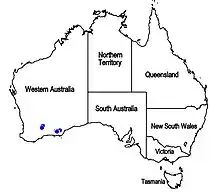| Dicrastylis capitellata | |
|---|---|
| Scientific classification | |
| Kingdom: | Plantae |
| Clade: | Tracheophytes |
| Clade: | Angiosperms |
| Clade: | Eudicots |
| Clade: | Asterids |
| Order: | Lamiales |
| Family: | Lamiaceae |
| Genus: | Dicrastylis |
| Species: | D. capitellata |
| Binomial name | |
| Dicrastylis capitellata | |
 | |
Dicrastylis capitellata is a species of plant within the genus, Dicrastylis, in the family Lamiaceae.[4] It is endemic to the south of Western Australia.[4]
Description
Dicrastylis capitellata is a low spreading shrub, growing from 20 cm to 25 cm high, in sandy loams. Its stems are roughly circular in cross section. The opposite and entire leaves are 7–25 mm long by 0.5-2.5 mm wide, and have branched (dendritic) hairs, and a blistered, puckered surface. There are no bracteoles, but there are bracts which are 2–3. mm long. The flowers are sessile. The calyx has five lobes (1.2–2 mm long), and is covered in dendritic hairs, and the blue corolla is 4–5 mm long, with no dots or stripes in its throat. There are five stamens. Flowers may be seen in May.[1]
Taxonomy
It was first described by Ahmad Abid Munir in 1978 as Dicrastylis capitellata, from a specimen collected by W.R. Archer.[2][3] There are no synonyms.[4]
References
- 1 2 3 "Dicrastylis capitellata". FloraBase. Western Australian Government Department of Biodiversity, Conservation and Attractions. Retrieved 22 November 2020.
- 1 2 "Dicrastylis capitellata". Australian Plant Name Index, IBIS database. Centre for Plant Biodiversity Research, Australian Government. Retrieved 22 November 2020.
- 1 2 Ahmad Abid Munir (1991). "Two new species of Dicrastylis J.Drumm. ex Harvey (Chloanthaceae) from Western Australia" (PDF). Journal of the Adelaide Botanic Gardens. 14 (1): 89-91a, Fig. 2, Map 1. ISSN 0313-4083. JSTOR 23874432. Wikidata Q92900977. Archived from the original (PDF) on 13 July 2020.
- 1 2 3 Govaerts, R., et al. "Plants of the World online: Dicrastylis capitellata Munir". Board of Trustees of the Royal Botanic Gardens, Kew. 2020. Retrieved 22 November 2020.
